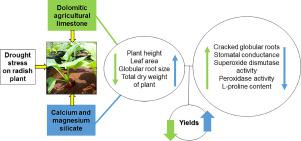Scientia Horticulturae ( IF 4.3 ) Pub Date : 2021-09-17 , DOI: 10.1016/j.scienta.2021.110600 Vander Rocha Lacerda 1 , Andres Felipe Gaona Acevedo 1 , Isabelly Cristina da Silva Marques 1 , William José Dellabiglia 1 , Andrew Kim Lopes Ferraz 1 , Letícia Silva Pereira Basílio 1 , Fernando Broetto 2

|
Silicon is the second most abundant element in the Earth's crust and has several beneficial effects on plants, such as increase photosynthetic capacity and improve the architecture of the aerial parts. Water stress negatively affects plant development and, specifically in horticultural species, impacts metabolic processes with consequences on quality and productivity. The aim of this research was to investigate through physiological and biochemical parameters if the use of silicate in place of dolomitic limestone can contribute to the tolerance of radish plants submitted to water deficiency. The experiment was carried out in a greenhouse in Botucatu, Brazil, with radishes of the Apolo variety, distributed in randomized blocks in a 3 × 2 factorial scheme, being three irrigation depths, with high soil moisture at tensions corresponding to 10 kPa (control, FC - field capacity), 20 kPa (MWD - moderate water deficiency), and 30 kPa (SWD - several water deficiency), and two soil correctives, limestone and silicate, totaling six treatments and three repetitions. Irrigation management was performed with tensiometers. The parameters evaluated included biometrics, biomass, growth rates, photosynthesis, enzymatic activity, soluble protein, and proline. Through discussion of the results, it was possible to conclude that the silicate provided tolerance to water stress, reduced the percentage of cracked roots, and increased yield in the radish crop. Therefore the use of silicate in arid areas with low water availability is of great importance.
中文翻译:

硅作为萝卜作物缺水胁迫的缓解剂
硅是地壳中含量第二丰富的元素,对植物有多种有益影响,例如增加光合作用能力和改善地上部分的结构。水分胁迫对植物发育产生负面影响,特别是在园艺物种中,会影响代谢过程,从而影响质量和生产力。本研究的目的是通过生理和生化参数调查使用硅酸盐代替白云质石灰石是否有助于萝卜植物对缺水的耐受性。该实验在巴西 Botucatu 的一个温室中进行,使用 Apolo 品种的萝卜,随机分布在一个3 × 2 因子方案,即三个灌溉深度,在张力下具有高土壤水分,对应于 10 kPa(控制,FC - 田间持水量)、20 kPa(MWD - 中度缺水)和 30 kPa(SWD - 几种缺水) ,以及两种土壤矫正剂,石灰石和硅酸盐,总共六个处理和三个重复。灌溉管理是用张力计进行的。评估的参数包括生物特征、生物量、生长速率、光合作用、酶活性、可溶性蛋白质和脯氨酸。通过对结果的讨论,可以得出结论,硅酸盐可以耐受水分胁迫,减少根裂的百分比,并提高萝卜作物的产量。因此,在缺水的干旱地区使用硅酸盐非常重要。



























 京公网安备 11010802027423号
京公网安备 11010802027423号